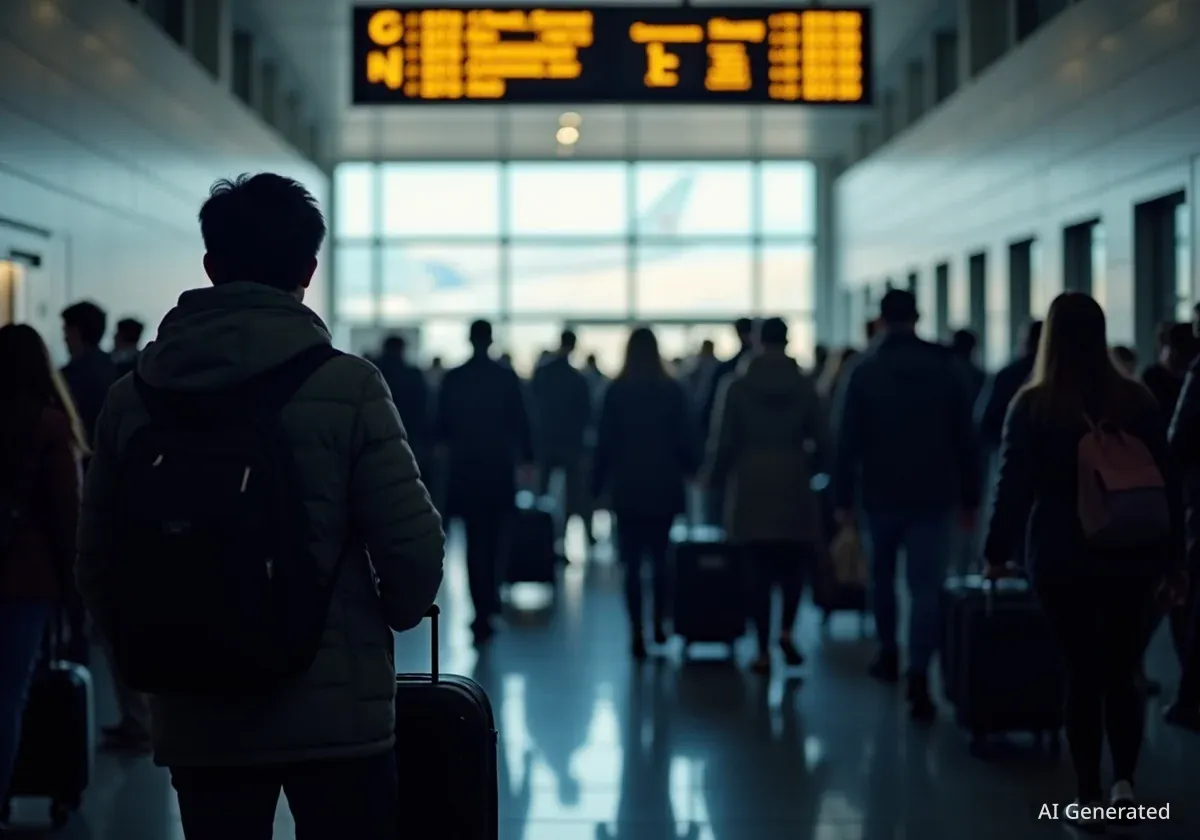A sudden increase in the annual fee for H-1B visas, announced by the US administration, has led to a rush of last-minute flight bookings from India to the United States. H-1B visa holders in India are urgently trying to return to the US before the new fee of $100,000 takes effect. This change is scheduled for 12:01 am Eastern Time (9:31 IST) on September 21. If employees do not return by this deadline, their employers will face the $100,000 fee for their re-entry.
The unexpected policy shift has caused significant disruption and uncertainty for many skilled foreign professionals working in the US. Social media platforms have seen numerous complaints about rising airfares due to the sudden demand for flights.
Key Takeaways
- US imposes a new $100,000 annual fee for H-1B visas.
- H-1B visa holders in India must return to the US by September 21 to avoid the fee.
- Major tech companies like Microsoft and Amazon urged employees to return quickly.
- Last-minute flight bookings from India to the US have surged.
- Airfares for these routes have also increased significantly.
Immediate Impact on Travel and Airfares
The announcement from the US administration has created an immediate surge in travel demand. Travel booking companies have observed an unusual pattern of last-minute reservations.
“There has been a notable increase in last-minute bookings to the US since this morning. This increase in bookings for same-day or next-day travel is atypical for a long-haul segment,” a spokesperson for travel booking major MakeMyTrip stated.
Industry sources confirm a significant spike in bookings for both direct and connecting flights to the US. This sudden demand has directly impacted air ticket prices, leading to higher costs for travelers.
Several American software companies, including Microsoft, Meta, and Amazon, have instructed their H-1B employees abroad to return to the US within a single day. Employees already in the US were advised to remain in the country for the foreseeable future. This directive has added to the urgency and complexity of the situation.
Airline Responses and Flight Availability
Air India is the only Indian airline that offers direct flights between India and the United States. A few American carriers also operate direct routes to India. Given the short deadline, the primary demand is for direct flights, which are the quickest option.
Quick Fact
H-1B visa holders make up approximately 72% of the beneficiaries of this visa category, with a significant number being skilled Indian professionals.
However, there has also been an increase in bookings for connecting flights through major international hubs. These hubs include Dubai, Abu Dhabi, Doha, Singapore, and Hong Kong. Air India's flights to the US, especially its Delhi-New York and Mumbai-New York services, saw a notable rise in immediate travel bookings over the recent weekend. Flights to other US destinations also experienced higher-than-usual last-minute bookings.
Corporate Directives and Employee Concerns
Companies are actively communicating with their H-1B visa-holding employees to guide them through this change. Microsoft issued a clear instruction to its employees:
“If you are in H-1B status and are in the US, you should remain in the US for the foreseeable future. We know this may interrupt your travel plans. But the critical thing is to stay in the US in order to avoid being denied re-entry.”
For employees outside the US, Microsoft's message was urgent: “If you are in H-1B or H-4 status and are currently outside the US, we strongly recommend that you do what you can to return to the US tomorrow before the deadline. The Proclamation was released within the last 30 minutes, so we realize that there isn’t much time to make sudden travel arrangements. But again, we strongly encourage you to do your best to return.”
Background on H-1B Visas
The H-1B visa is a non-immigrant visa that allows US employers to temporarily employ foreign workers in specialty occupations. These occupations generally require a bachelor's degree or higher in a specific field. The program is crucial for many technology companies seeking skilled talent.
Amazon also instructed its H-1B and H-4 visa holders to avoid international travel for the foreseeable future. The company urged its Indian and other foreign employees currently outside the US to return by midnight EDT on September 21.
Meta advised its employees, especially those on H-1B and H-4 visas, to stay in the US for at least two weeks. This period is for the company to assess the “practical applications” of the new policy. Employees outside the country were told to return within 24 hours.
Similarly, JP Morgan sent an internal email mandating that all staff return to the U.S. by 12:01 AM ET on September 21. The company also advised all H-1B visa holders to remain in the US and avoid international travel until further notice.
Future Travel Plans and Cancellations
Travel industry insiders suggest that the uncertainty caused by the new visa fees will likely lead to many cancellations of flight bookings. These cancellations would typically be for H-1B visa holders planning to visit India in the coming weeks and months. This is especially true for the peak NRI travel season, which typically runs from October to December for festival and winter holidays.
Reports from the US indicate that some H-1B visa holders and their families even left aircraft that were about to depart the country after learning about the new visa rule. This highlights the immediate and impactful nature of the policy change.
“While there is a clear rise in demand, it is not exactly a crisis situation at a broader level as the travel season is yet to take off. The situation would have been a lot more chaotic had this happened around Diwali or year-end holidays, when a lot of NRIs tend to visit India,” an aviation sector executive commented.
Airlines are now preparing for a large number of cancellations for flights from the US to India. This could significantly alter travel patterns for the upcoming holiday season. The Indian government has also voiced concerns over the new $100,000 fee, citing its humanitarian impact and potential family disruptions. They have urged the US to address these issues, while industry and policymakers continue to study the move for its broader implications.
Economic and Social Implications
The new H-1B visa fee could have broad economic and social implications. For employers, the $100,000 fee represents a substantial increase in the cost of employing foreign skilled workers. This might influence hiring decisions and potentially shift talent acquisition strategies.
For visa holders and their families, the immediate scramble to return to the US creates significant personal stress and financial burden. The potential for family separations and disrupted travel plans during holiday seasons adds a humanitarian dimension to the policy change. India's concerns reflect these broader impacts on its citizens working in the US.
- Impact on Tech Sector: The US technology sector relies heavily on H-1B visa holders for specialized roles. Increased costs could affect innovation and competitiveness.
- Family Disruptions: Many H-1B holders have families who may be affected by travel restrictions or increased re-entry costs.
- Airline Industry Adjustments: Airlines must adapt to immediate surges in demand followed by potential cancellations, impacting their scheduling and revenue forecasts.
The situation remains fluid as both governments and companies assess the long-term effects of this policy. Skilled Indian professionals, who represent a significant portion of H-1B beneficiaries, are particularly affected by this sudden change.





